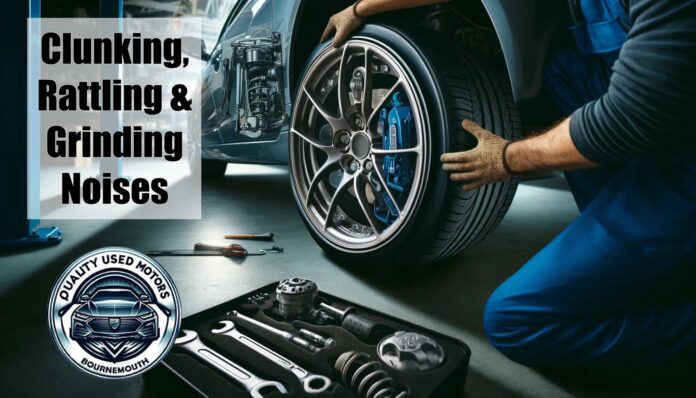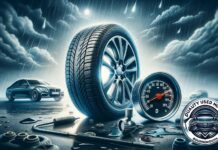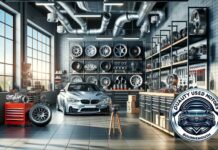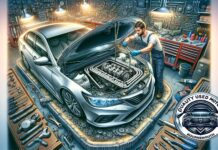Understanding Car Wheel Noises
Hearing unexpected noises from your car, like clunks and grinds from the wheels, can be worrying. But, there’s no need to panic. These sounds, though alarming, often point to common issues that, with the right approach, can be easily fixed. This guide aims to demystify the noises your car makes, breaking down the reasons behind them and outlining the typical costs for repairs. Whether it’s a problem with the suspension, brakes, or something else, understanding what your car is telling you can make a big difference. We’ll walk you through the essentials, focusing on providing clear, useful information to help you address these noises without the stress. Remember, tackling car problems promptly not only keeps your ride smooth but can also prevent bigger, more expensive issues down the line.
Deciphering the Clunk: Key Culprits Uncovered
1. Suspension Troubles:
The car suspension system’s arms and bushings work together to support the vehicle’s weight, absorb road shocks, and allow for precise wheel movement and alignment, ensuring a smooth and stable ride.
Symptoms/Noises: You’ll typically hear a clunking or knocking noise when going over bumps or during sharp turns. The ride may also feel rougher, as the suspension isn’t absorbing shocks as efficiently.
Repair/Replacement Costs: Costs can range from £100 to £300 per arm, a worthy investment for regaining your ride’s smoothness.
2. Shock Absorbers:
Car shock absorbers dampen the impact and vibrations from road irregularities, providing a smoother ride and maintaining tyre contact with the road for improved safety and handling.
Symptoms/Noises: Failed shock absorbers often result in a noticeable thump or clunk when the car travels over potholes or uneven surfaces, accompanied by increased body roll and a bouncy ride.
Repair/Replacement Costs: Costs are typically between £100 to £250 per shock, ensuring your car remains stable on the road.
3. Handbrake Concerns:
A car handbrake, also known as a parking brake, mechanically applies the rear brakes through a lever or button, securing the vehicle in place when parked and serving as an emergency braking system if the main brakes fail.
Symptoms/Noises: A dragging sound, rather than a distinct clunk, might be heard if the handbrake is not fully released. If there are mechanical issues within the handbrake system, you might notice a lack of resistance or effectiveness when engaging it.
Repair/Replacement Costs: Costs are between £50 to £100, with more extensive repairs or component replacements ranging up to £250.
4. Compromised Springs:
Car springs absorb road irregularities and shocks, supporting the vehicle’s weight and maintaining tyre contact with the road, contributing to a comfortable ride and effective handling.
Symptoms/Noises: Broken springs can cause a loud clunking sound, particularly when driving over bumps. You might also notice that your car sits lower than usual, particularly at one corner.
Repair/Replacement Costs: Costs may fall between £100 to £200 per spring, generally advised to be replaced in pairs.
5. Strut Bearings or Mounts:
Car strut bearings and mounts connect the suspension strut to the vehicle’s chassis, facilitating smooth steering movement while isolating road noise and vibrations, ensuring a quieter and more comfortable driving experience.
Symptoms/Noises: A grinding or clunking noise when turning the steering wheel, often accompanied by a feeling of binding or sticking as you turn, can indicate worn strut bearings or mounts.
Repair/Replacement Costs: Replacing them can cost between £150 to £300 per strut, contributing to a smoother driving experience.
6. Wheel Bearings:
Wheel bearings enable the wheels to rotate smoothly and efficiently with minimal friction, supporting the car’s weight and playing a crucial role in the safety and handling of the vehicle.
Symptoms/Noises: A failing wheel bearing can produce a grinding or groaning noise that gets louder with vehicle speed. It might also sound like a persistent hum that correlates with speed, rather than a clunk.
Repair/Replacement Costs: Replacement typically costs £120 to £200 per wheel, which is essential for safe vehicle operation.
7. Drive Shafts or CV Joints:
Driveshafts or CV (Constant Velocity) joints transmit power from the vehicle’s transmission to the wheels, accommodating the suspension system’s movement while ensuring smooth and consistent wheel rotation during turns and varying road conditions.
Symptoms/Noises: You may hear a clicking or popping noise when making turns. This is a common sign of worn CV joints. If the drive shaft is the issue, the sound may be more of a clunk when accelerating or decelerating.
Repair/Replacement Costs: Replacement costs vary widely, from £250 to £500, depending on the vehicle and specific issue.
8. Differential Problems:
The car differential allows the drive wheels to rotate at different speeds, providing balanced power distribution while turning, which is crucial for smooth cornering and maintaining traction and stability on the road.
Symptoms/Noises: A bad differential can produce a whirring, howling, or clunking noise, particularly noticeable at certain speeds or when turning.
Repair/Replacement Costs: Repairs can range significantly, from £200 for minor issues to over £1000 for a full overhaul.
9. Exhaust System Issues:
The exhaust system directs harmful gases from the engine out of the vehicle, reduces engine noise, and helps improve engine performance and fuel efficiency by ensuring optimal exhaust flow.
Symptoms/Noises: Loose or damaged exhaust components can rattle or bang against the underside of the car, especially noticeable at low speeds or when starting the engine.
Repair/Replacement Costs: Minor repairs might cost £50 to £150, with more comprehensive repairs or replacements reaching £150 to £500.
10. Sway Bar Links and Bushings:
Sway bar links and bushings connect the sway bar to the vehicle’s suspension, reducing body roll during turns, enhancing stability and handling, and contributing to a safer and more comfortable driving experience.
Symptoms/Noises: Worn sway bar links or bushings can lead to a rattling or clunking noise when driving over bumps or during sharp turns, as the stabiliser bar moves more than intended.
Repair/Replacement Costs: Replacement costs of £50 to £150 per link, often replaced in pairs for best performance.
11. Loose Lug Nuts:
Lug nuts securely fasten the wheels to the vehicle’s hub, playing a critical role in the safety and performance of the car by ensuring that the wheels remain attached to the car under all driving conditions.
Symptoms/Noises: This might produce a clunking sound that becomes more apparent at certain speeds. It’s a dangerous condition that can lead to the wheel becoming detached from the vehicle.
Repair/Replacement Costs: Cost typically under £20.
Diagnosis and Repair: A Professional Approach to Vehicle Noises
The sudden emergence of unexpected noises from your vehicle can understandably lead to a sense of unease. Beyond the mere auditory disturbance, these sounds often act as harbingers, signalling underlying issues that could potentially compromise both the health and safety of your vehicle. Addressing these concerns promptly and efficiently requires a systematic and professional approach to both diagnosis and repair.
In the realm of automotive care, it is frequently the components that remain out of sight that demand our immediate attention through the medium of sound. Clunking, rattling, or grinding noises are more than mere inconveniences; they are the vehicle’s method of communication, alerting us to issues that necessitate a closer examination.
Steering Towards Silence: Ensuring a Smooth and Serene Drive
In the journey of vehicle ownership, encountering unexpected noises can indeed be a daunting experience, one that often comes with concerns about both the complexity of the issue at hand and the potential cost of repairs. However, it’s important to remember that with professional expertise and a systematic approach, virtually every issue you encounter is solvable.
The array of potential causes behind those perplexing clunking sounds—from suspension woes to differential dilemmas—might seem overwhelming at first glance. Yet, each can be addressed and rectified with the right knowledge and skills. Yes, repairs come with a cost, but the investment in your vehicle’s health and safety is invaluable. Not only does it ensure the longevity of your car, but it also enhances your driving experience, offering peace of mind that is truly beyond measure.
Let these insights serve not as a source of worry but as a roadmap for taking proactive steps toward your used car maintenance and repair. Remember, the costs associated with these repairs are not just expenses but investments in your vehicle’s future performance and reliability. With the support of trusted automotive professionals, you can navigate these challenges successfully, ensuring that your vehicle continues to serve as a reliable companion on your journeys.
So, take heart. Though the path may seem fraught with uncertainties, the destination—a safe, sound, and smooth-driving vehicle—is well within reach. These issues, while potentially complex, are far from insurmountable with the right approach and expertise. Your journey on the road is filled with promise, and with each repair, you’re not just fixing a problem but fortifying your vehicle’s integrity for the miles ahead.








